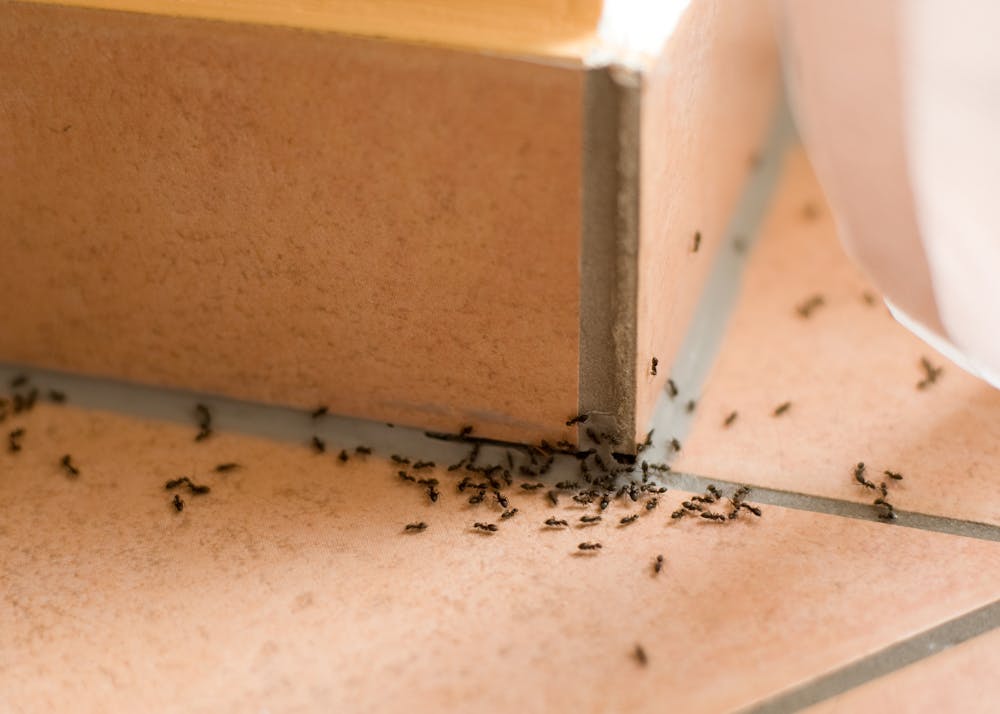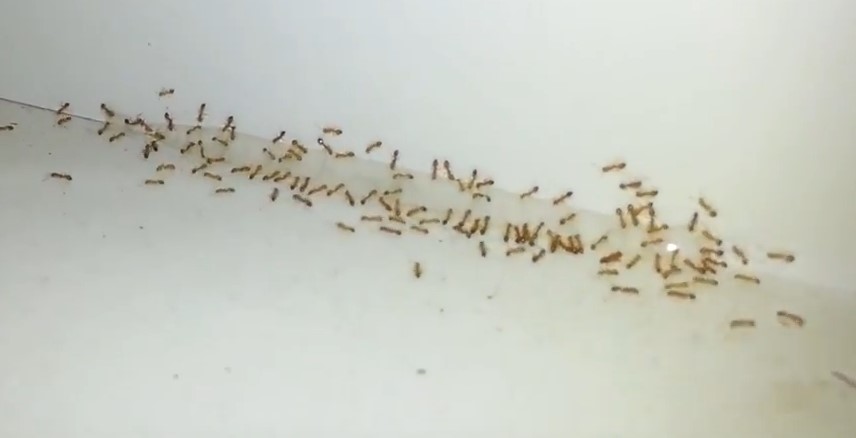Tiny ants in the kitchen are a common problem that many homeowners face. These ants, often referred to as sugar ants, can be difficult to get rid of. They are typically attracted to sweet foods and can quickly multiply if left unchecked. Understanding the biology of these ants and their habits can help you effectively manage them and keep them out of your home.
Identification of Tiny Ants
Have you ever noticed small black ants crawling around your kitchen and wondered what they were? Tiny ants in the kitchen can be difficult to identify since there are a number of ant species that are attracted to the warm, humid conditions of a kitchen. However, there are a few common types of kitchen ants that you should know about.
Carpenter ants, odorous house ants, and pharaoh ants are the most common types of ants found in kitchens. Carpenter ants are large, black ants that are typically found in wood, while odorous house ants are smaller brown or black ants that give off a musty smell when crushed. Pharaoh ants, which have yellow bodies with black markings, are attracted to sugary foods and can spread quickly in large numbers.
Identifying the species of ant in your kitchen is the first step in controlling and preventing infestations. To determine the species of ant, observe the size and color of the ants, as well as the type of food they are attracted to. Additionally, if you find ant nests or trails of ants, take note of the location and contact a professional pest control service to help you identify the ant species and devise a treatment plan.
Common Causes of Tiny Ant Infestations
Tiny ants in your kitchen can be a nuisance. But before you take any action to get rid of them, it’s important to understand what’s causing them to enter your kitchen in the first place. This article will explore the common causes of tiny ant infestations, and offer tips on how to prevent them from coming back.
The most common type of tiny ant infestation is caused by the presence of food sources in the kitchen. Ants are attracted to food that is left out, and they will quickly move in if they find something worth eating. Make sure to keep all food items stored in airtight containers, and clean up any spilled food or crumbs as soon as possible.
Another cause of tiny ant infestations is moisture. Ants need a source of water to survive, and they will quickly move in if the area around your kitchen is damp. To avoid this, make sure to keep your kitchen dry and free of standing water.
Finally, tiny ant infestations can also be caused by small openings in the walls or floors that lead directly to your kitchen. Check for any cracks or gaps around your kitchen, and seal them to prevent any tiny ants from entering.
By understanding the common causes of tiny ant infestations, you can take preventative steps to keep them away from your kitchen. Proper food storage, dryness, and sealing of cracks and gaps are all effective ways to keep your kitchen ant-free.
Preventative Measures to Keep Tiny Ants Away
Tiny ants in the kitchen are an unwelcome sight and can be a nuisance. To keep these pests away, it’s important to understand why they’re there in the first place. Tiny ants are often attracted to food sources, so it’s important to keep your kitchen clean of crumbs and food particles. Additionally, sealing cracks and crevices where the ants can enter is a good preventative measure.
In addition to cleaning and sealing your kitchen, you can also use baits and traps to capture and remove the ants. Baits are often the most effective way to get rid of tiny ants, as they are attracted to the sweet liquid and carry it back to the nest, which will help to eliminate the entire colony. Traps can be placed around the perimeter of your kitchen, and will capture any ants that enter.
Finally, natural repellents such as mint and citrus oils can be used to create a barrier around your kitchen that will keep the ants away. These oils can be diluted with water and sprayed around the perimeter of the kitchen, and will create an unpleasant environment for the ants.
By understanding why tiny ants are attracted to your kitchen, and taking the proper preventative measures, you can help to keep them away and keep your kitchen clean and ant-free.
Natural Solutions for Getting Rid of Tiny Ants
in Your Kitchen
Tiny ants are a common sight in many homes. While these tiny creatures may seem harmless, they can be a nuisance and potentially damage your food supply if left unchecked. Fortunately, there are some natural solutions that can help you get rid of tiny ants in your kitchen.
The first step in getting rid of the tiny ants in your kitchen is to identify where they’re coming from. Look for any nearby sources of food, such as open containers of sugar, honey, or other sweet items. If the ants are coming from outside, you may need to seal up any cracks or crevices near windows and doors.
Another natural solution to get rid of tiny ants in the kitchen is to use borax. Borax is a natural insecticide that can be mixed with sugar and water to create an ant bait. Place the solution in areas where the ants are likely to find it, and they will take it back to their nest to share with the rest of their colony.
Finally, you can use natural repellents such as peppermint oil, cinnamon, or lavender to keep the tiny ants away from your kitchen. Simply sprinkle a bit of the essential oil around the perimeter of the room or mix it with water and spray it around the area.
Although tiny ants may seem like a minor issue, they can quickly become a major problem if not dealt with quickly. Thankfully, there are a few natural solutions that can help you get rid of tiny ants in your kitchen without resorting to harsh chemicals. By identifying where the ants are coming from, using borax to create an ant bait, and using natural repellents, you can effectively get rid of the tiny ants in your kitchen.

Chemical Solutions for Getting Rid of Tiny Ants
Having tiny ants in your kitchen can be a nuisance, but it is important to identify the species of ant to determine the best chemical solution for getting rid of them. For instance, some ants are attracted to sweet foods, while others prefer protein-rich foods. Knowing which type you’re dealing with can help you determine the best course of action.
Some chemical solutions for getting rid of tiny ants include baits, sprays, and dusts. Baits are typically made with a slow-acting chemical that attracts and kills the ants when they eat it. Sprays are used to kill ants on contact, while dusts are designed to be placed in areas where ants frequently travel. If you’re dealing with a large infestation, it’s often best to use a combination of all three solutions.
It’s important to remember that chemical solutions for getting rid of tiny ants should be used in moderation. Overuse can be harmful to your health and the environment, and could even encourage the ants to become resistant to the chemicals. Before using any chemicals, be sure to read the instructions and safety warnings on the packaging. Additionally, you should always wear protective gear when handling these products.
Getting rid of tiny ants in your kitchen can be a challenge, but with the right chemical solutions, you can eliminate the problem quickly and effectively. Be sure to identify the species of ant you’re dealing with, use products in moderation, and always follow the safety instructions on the packaging. With these tips, you’ll be able to keep your kitchen ant-free in no time.
Professional Extermination Solutions for Tiny Ants
Tiny ants can be a pesky problem in any kitchen. They are often found in pantries, under shelves, and around food sources. Although they may seem harmless, these small insects can quickly multiply and cause a major infestation. The best way to get rid of these tiny invaders and prevent them from returning is to invest in professional extermination solutions.
Professionals use a variety of methods to eliminate tiny ants, including chemical sprays, baits, and natural remedies. Sprays are often applied to the infested areas to kill ants and prevent them from returning. Baits can also be used to attract the ants and lure them away from food sources. Natural remedies, such as diatomaceous earth and boric acid, are also effective at eliminating ant infestations.
Additionally, professionals can apply preventative treatments to help keep tiny ants from returning. These treatments can include sealing up any cracks or crevices where the ants may be entering the home, as well as applying a perimeter treatment around the exterior of the home. By using a combination of these solutions, homeowners can eliminate tiny ant infestations and reduce the chances of them returning in the future.
If you’ve noticed tiny ants in your kitchen, don’t hesitate to contact a professional exterminator. They can provide effective extermination solutions and preventative treatments that will help you get rid of these pesky little pests and keep them from returning.
Dealing With Long-Term Tiny Ant Issues
Tiny ants in your kitchen can be a real nuisance, but they can also be a long-term problem if not dealt with properly. The most common species of tiny ants found in kitchens are odorous house ants, pavement ants, pharaoh ants, and thief ants. While these tiny ants can be easily dealt with using store-bought bug sprays, long-term control requires more than just a quick fix.
To effectively eliminate tiny ants from your kitchen, it is important to identify the source of the problem and take steps to prevent future ant infestations. Start by thoroughly cleaning your kitchen, as ants are attracted to food particles and crumbs. Also, make sure to seal any cracks or gaps around windows, doors, and baseboards that may be providing an entry point for the ants.
Next, consider using ant baits, which are small containers filled with food that attract ants. Once the ants have been lured into the bait, they will take the food back to their colony, killing the queen and eliminating the infestation. Additionally, you can use ant sprays or dust to kill the ants on contact.
Finally, it is important to stay vigilant and keep an eye out for any signs of ant activity. If you notice any tiny ants, take swift action to prevent the infestation from becoming a long-term problem. With a bit of effort and patience, you can easily keep tiny ants out of your kitchen for good.
Conclusion
The presence of tiny ants in your kitchen is a common problem that many homeowners face. If you’re dealing with an ant infestation, you’ll need to take steps to identify the type of ant and target its nesting areas. Proper sanitation and exclusion techniques can help to keep the ants from coming back. With the right strategies, you can get rid of the ants in your kitchen and keep them from coming back.


